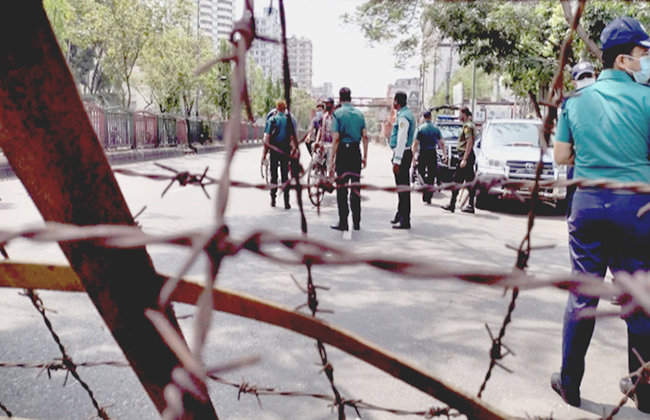
Experts think that the ongoing lockdown in Bangladesh appears to be paying off as both the active coronavirus cases and death toll have marked a sharp fall over the last few days in the country.
They, however, fear that the benefits might be short-lived ones as the government has allowed shopping malls to reopen and is thinking of resuming public transport services soon though the virus is yet to come under control.
The analysts warned that the Covid situation is likely to worsen again with the hordes of shoppers and holidaymakers ahead of Eid-ul-Fitr, one of the largest religious festivals of Muslims to be celebrated in the middle of this month.
They advised the government to announce a stimulus package for the transport workers instead of resuming transport service, enforce the law to make people to wear masks and maintain health safety rules and increase vigilance along the border to check any possible trespassing or illegal entry to Bangladesh from India to maintain the improved trend in the Covid situation.
The government imposed a complete countrywide lockdown on April 14 for a week to tackle the worsening Covid situation, and later it was extended up to May 5. But the government gave permission for reopening shops and malls across the country from April 25 amid lockdown.
Road, Transport and Bridges Minister Obaidul Quader said on Saturday the government is considering the resumption of public transport services in the country ahead of Eid.
Bangladesh’s health authorities reported 69 more deaths and 1,359 new cases in 24 hours until Sunday morning.
The virus infection rate that increased to 23 percent early last month has now dropped to 9.60 percent on Sunday.
Dr Be-Nazir Ahmed, former director (disease control) of the DGHS, said the fall in the number of Covid cases and deaths has manifested that the ongoing lockdown has proved to be good.
“As the offices and mass transport service remains shut, people’s movement has declined, contributing to reducing the virus transmission,” he said
“But we can’t still say whether we’re getting rid of the second wave of the virus soon. We can only say the lockdown has proved effective in containing the virus,” the expert observed.
Professor Dr Mohammed Atiqur Rahman, treasurer at Bangabandhu Sheikh Mujib Medical University (BSMMU), said it seems the coronavirus situation is coming under control due to the lockdown.
“As we’re allowing people to go to shopping malls and thinking of resuming public transport, the virus infection may spike again after the eid. So, we should remain aware of the situation as public apathy to health safety rules will only invite danger again,” he warned.
“The virus infection rate declined significantly in India early this year. As the country allowed different political, religious and social gatherings later, the virus surged again and it’s now out of control,” Dr Atiq reminded.
Public health expert MH Chowdhury (Lenin), chairman of the medicine department at the Health and Hope Hospital, said the positive impact of the lockdown is now visible as both the virus infection and fatality rates have dropped.
Dr Be-Nazir said the benefits of the lockdown may not be sustainable if the government ease it after May 5. “I think the lockdown should continue until the eid keeping the public transport suspended.”
He said those who live in different cities, including Dhaka, used to go back to their village homes crowding the public transports before and during the eid. It’s a matter of concern. So, the government shouldn’t allow resuming the public transport before the eid to contain the spread of the virus.”
Dr Lenin said the government should focus on checking the travel rush of people from different cities before eid. “I think the government shouldn’t allow operating the buses till one week after the eid.
He said the government can announce an incentive package for transport workers and small owners by keeping their service suspended.
Dr Be-Nazi said there is no room for complacency over the falling trend of the virus. “We must identify the infected people rapidly and isolate them from others. “We also need to do contact tracing.We should not decrease the tests in any way to maintain the decreasing trend of the virus.”
Dr Lenin said there is a high chance that the double-mutant virus from India may spread to Bangladesh as people are entering the country from India both legally and illegally though the government decided to shut the border.
Dr Abu Jamil Faisel, a member of the public health expert team formed by the government for the eight divisions, said the country is probably overcoming the second wave of Coronavirus, but he feared the third wave may come after withdrawal the lockdown.
He also fears that if the Indian double-mutant strain enters the country it will take a heavy toll on the public health.
“Once the strain is here, the transmission rate will spike and many people will die. As we’re a close neighbour of India with a huge border, I think it’ll be difficult to check the transmission of the Indian virus in Bangladesh,” Faisel added.
Dr Atiq said the country’s health sector has no capacity to tackle the terrible Covid situation what India has been facing now due to a double-mutant virus strain.”We should intensify our preventive measures so that this mutant can’t spread to our country.”
Dr Be-Nzir said the restriction on the border should not be lifted until the virus situation comes under control in India. “We should strictly ensure a 14-day institutional quarantine of those coming from India.”
He also said ensuring cent percent use of masks is the best prevention against the virus, including the Indian variant.
Dr Lenin said, “We must take some preventative and curative measures. We should ensure that our people are wearing masks, maintaining health hygiene rules and avoiding mass gatherings. Besides, we’ve to prepare our hospitals to tackle a possible worse situation by equipping those with necessary equipment and oxygen plants to effectively handle it if the virus cases surge again after the eid.
He said genome sequencing should be done regularly taking the samples of the positive cases to identify promptly if the Indian virus spread to the country.
The expert said even if a single person can enter Bangladesh with the Indian double-mutant virus, he or she can transmit it to 406 people. So, only one case is enough for the outbreak of the deadly strain across the country.”
“We need to put in our best efforts to restrict the entry of the virus into our country. BGB members should play a proactive role in stopping the illegal entry of people from India.’


